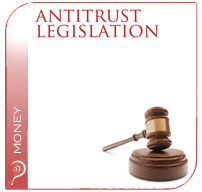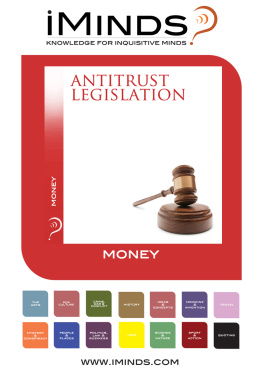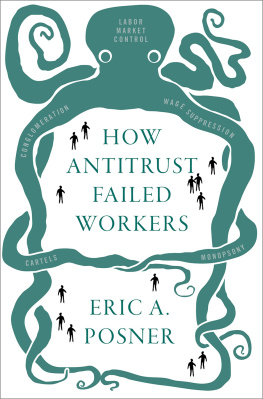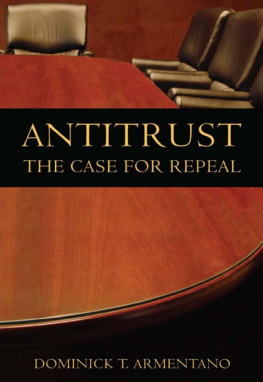Money
Antitrust Legislation
2010 by iMinds Pty Ltd.
All Rights Reserved.
Money: Antitrust Legislation

Competition is an essential part of the free market. The competition between participants in the market promotes efficiency. This occurs as the supply of a product is improved to provide more attractive prices than a competitor can offer. Competition also drives innovation, as producers develop superior products and services to gain the favour of buyers. As all competitors engage in such behaviour, productivity and efficiency increase, contributing to economic growth.
All suppliers of a similar product should theoretically offer similar prices in relation to the supply of and the demand for their product. If a company raises the price of its product, consumers will instead buy from a competitor who offers a similar product as a lower cost. As a result, markets should not require regulation by government and should operate to the benefit of consumer welfare.
Therefore, competition works to provide economic benefit to the consumer and promote economic growth. However, business practices and behaviours can distort competition to the benefit of the producers. In order to prevent such manipulations of the market, antitrust legislation is put in place to protect the economic welfare of consumers.
Antitrust law, or Competition law as it is known outside of the United States, is a body of laws and policy aimed at preventing anti-competitive practices. The foundation of current antitrust law is the American Sherman Act which was adopted in 1890. Named after the senator who created the bill, it was aimed at trusts that had developed in the American economy during that time. These were combinations of businesses created through common law trust. A board of trustees would acquire the stocks of other companies to gain control over their management. They could then control market prices to their own advantage. Competition was constrained and prices were fixed in both the railway and oil industries during this time. Public protests against these monopolies lead to the government adopting the Sherman Act.
The Sherman Act declares in its first section that every contract, combination in the form of trust or otherwise, or conspiracy, in restraint of trade is illegal. In its second section, any person who would monopolise or attempt to monopolise any part of the trade or commerce is deemed guilty of a felony. Due to the lack of enforcement and confusion over the acts key terms, further legislation was required to increase its effectiveness. The Clayton Act, adopted in 1914, was more detailed in the anti-competitive activities that it proscribed, and has been added to over the 20th century to strengthen antitrust legislation.
Antitrust law is seen to have a number of goals. By preventing anti-competitive activities the consumers economic welfare is protected. The freedom of consumer to seek a fair price is preserved by laws regulating price fixing and market domination. Another goal is to protect entry into the market by smaller competitors. In markets where larger, established firms may hold greater sway, these laws restrict such firms from exercising their market power, thereby allowing smaller companies to compete. These laws also encourage the redistribution of both economic wealth and economic power by limiting the amount of both that a company is able to accrue. Antitrust laws have also had political goals. A fear at the time when the Sherman Act was adopted was that large monopolies could gather enough economic and decision making power to threaten democratic government. Although such conspiratorial threats may have lessened, competition laws can still have some political motivations, such the privatisation of previously state controlled monopolies.
Modern antitrust laws regulate several business activities. These include monopolies, horizontal and vertical agreements and mergers. A monopoly is formed when a company is the only provider of certain good or service within its market. As previously mentioned, a monopoly can form if it gains control of the majority of its competitors. The dominant company can then force the remaining competitors out of the market through aggressive pricing. Horizontal agreements of trade exist when companies participating in the same industry collude rather than compete. This can take the form of cartels and price fixing. Vertical agreements involve collusion at various levels of a product's distribution. This could involve price fixing between the manufacturer and the distributor of a product or proscribe to who a product may be sold. This has also been a concern with vertical contracts where, for instance, a customer company acquires the supplier. While vertical contracts were believed to be anti-competitive, opinions have been changing on this type of vertical agreement. They are, however, closely related to mergers. Both horizontal mergers, that is, mergers between competitors, and vertical mergers have a potential for the abuse of market power. A merger may create a market entity that can put greater pressure on a market or gain market dominance outright. Therefore, Anti-trade law polices these mergers. Commonly, deals of a certain size must be reported to the relevant regulating bodies for an investigation to be carried out.
Antitrust legislation has both similarities and differences as it is applied to different jurisdictions. While America's legislation was developed prior to the 1900s, many nations only developed competition laws during the 1990s. The laws are enforced generally by government bodies, though private enforcement may be possible according to legislation and policy. In America the law is enforced by the Department of Justice and the Federal Trade Commission. In the European Union, the Competition Directorate of the European Commission is the enforcing body. As the Sherman Act in America defines anti-competitive practices as felonies, individuals can be sentenced for up to 10 year imprisonment terms and be fined in excess of $1 million dollars. Fines levelled at companies can reach $100 million dollars.
Perhaps one of the most well known antitrust cases was the prosecution of Microsoft. This lawsuit continued from 1998 until Microsoft was successfully charged in 2000. Although there were several competitors in the computer market, Microsoft was seen to be dominant. That the majority of computer applications at the time could only be used on the Windows platform created an applications barrier to entry to this market. With the rise of the internet in the 1990s, Netscape developed their Navigator web browser. This web browser operated on the Java programming language, allowing a new platform for applications to be developed. This removed the application barrier to entry. Microsoft subsequently engaged in various activities to undermine Navigator and its Java platform. This was seen to be an abuse of its market dominance and power to maintain its monopoly.
Concerns have been raised about antitrust as it is applied to the so-called new economy that has developed from information technology. As this new economy focussed on innovation and intellectual property, revision of antitrust laws have been considered. However, it was found that the laws remained both applicable and adaptable. With the development of global markets, further adaptability and international cooperation is required as large corporations operate over several jurisdictions. Intellectual property is also becoming a major issue in this field. The current challenge is to either allow a global body to oversee antitrust laws, or for national bodies to develop common laws by which regulation can be carried out. Although the need for a solution is recognised, a workable answer has not yet been decided.

















